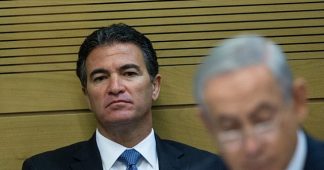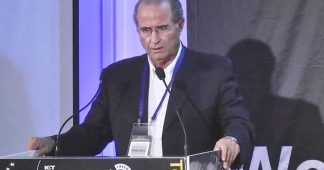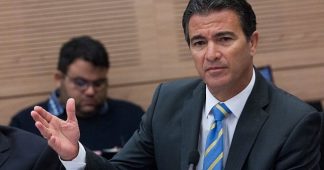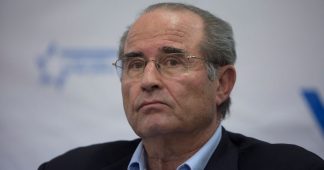Israel’s famed and feared intelligence agency was said to have stolen medical equipment to boost the country’s Covid-19 defence. In reality, it has boosted Netanyahu’s standing
Yossi Melman, Dan Raviv
24 April 2020
Prime Minister Benjamin Netanyahu violated Israel’s standard rules of secrecy last month by announcing that he ordered the Mossad, his country’s famed and feared espionage agency, to procure medical equipment and health supplies urgently needed for the fight against the coronavirus.
Weeks later, it is apparent that both Netanyahu and the espionage agency were out to bolster their image. But as reality comes into focus, this gambit may be backfiring.
As usual, when the Mossad is mentioned, media around the world paid attention, and some speculated that Israeli spies would fan out and use deception and subterfuge to snatch life-saving supplies – if necessary, out of the proverbial mouths of babes.
Many Mossad veterans, as well as its employees, who are not permitted to express publicly their views, oppose the involvement of the agency in a purely civilian matter. They say it results in an unattractive image and provides little in way of accomplishments. They also suggest that Netanyahu’s chief goal was to strengthen his chances of extending his 11-year run as prime minister, rather than protect Israeli citizens.
Since 2 March, when the third election in a year produced indecisive results, he has divided his time between the coronavirus crisis and delicate coalition negotiations.
Eventually, Netanyahu’s main rival, Benny Gantz, former chief of staff and leader of the Blue and White party, caved in, abandoning all of his beliefs and his political agenda by agreeing to join the premier in a “national unity” government. All this plays out in the shadow of fraud and bribery charges likely to lead to Netanyahu standing trial within months.
As for the Mossad, while it officially has no spokesman and no public relations policy, agency officials enjoy the power of their mythology. Israel’s enemies, whether they are nations, organisations or individuals, are reputedly terrified of the Mossad. Political leaders in friendly countries evidence great respect for Israeli operatives who are made out to be almost omniscient and omnipotent – in times of war, peace, or a pandemic.
Netanyahu likes to attach his prestige to that of the sanctified Mossad, and bringing the clandestine agency into the coronavirus picture was a way to show that he was pulling out all the stops in a quest for much-needed medical gear.
He has been trying to drown out the emerging fact that Israel was unprepared for this crisis.
Despite a history of wars, terrorism, and concern that enemies could one day use biological weapons, the country did not have what it needed. Israeli technology and research capabilities are excellent, but when it came to ventilators and personal protection equipment for healthcare workers, storehouses were bare.
An ally in Cohen
In addition, Netanyahu was out to build the reputation of his hand-picked spymaster, Yossi Cohen. The Mossad director, who spent three years as the prime minister’s national security advisor, is one of the few people who enjoys his complete trust.
Cohen does not seem to mind being drawn into his boss’s political ambitions. In April 2018, the espionage chief went along with Netanyahu’s insistence that one of Israel’s greatest coups in the secret war against Iran’s nuclear programme – the Mossad’s daring theft of a huge archive of documents from Tehran – be trumpeted to the world.
Netanyahu has started grooming Cohen as a possible heir – shining a spotlight on the man he sent into the shadowy world of assassinations and other clandestine work.
In recent weeks, the Mossad returned to its longtime habit of myth manufacturing, letting the world’s media run wild with exaggerated tales of Jewish 007s craftily smuggling goods to their country’s hospitals. Cohen and his top aides stationed themselves at Israel’s largest medical facility, the Sheba Medical Center, and made no effort to quash the stories.
The truth is far simpler. The Mossad’s main role is managing a national control centre, where the agency installed computers and communication lines. The decision-makers, however, are dozens of doctors, high-tech experts and officials from the ministries of health, finance and defence, who coordinate the battle against the coronavirus pandemic.
They have actually done quite well, as the death toll in Israel – 193 as of Thursday – is lower than was feared in the country of almost nine million people. One key to success is a tracking system far more intrusive than anything any western government would feel it can do.
The domestic security agency, Shin Bet, was ordered by Netanyahu to send a text message to any Israeli who came within a few yards of a known coronavirus sufferer. The location of every mobile phone in the country is the key to that, and it is a capability that Israeli intelligence wields to locate militants and their accomplices.
As for procuring equipment, neither the Mossad’s mystique nor its inexperience came into play.
Thanks to a team effort, Israel has signed contracts to import 14,000 ventilator machines, tonnes of oxygen, and tens of millions of masks, gloves, goggles and gowns for health workers. The purchases were from commercial suppliers in China and Europe. None of it was stolen.
The well-placed Israelis who envision damage to the Mossad’s prestige include former secret agents; some worry that their erstwhile colleagues will be thought of as cold-hearted thieves in a medical black market.
They are also concerned that spurious missions of this kind, motivated by domestic politics, could distract from the vital authentic and perpetual duties of Israel’s secret warriors.
Above all, they doubt it was wise for Netanyahu and Cohen to drag the Mossad into a civilian realm in which it has no expertise, no operational edge, and no significant contribution of which to be proud.
* Yossi Melman and Dan Raviv are co-authors of “Spies Against Armageddon”, and “Every Spy a Prince”.











